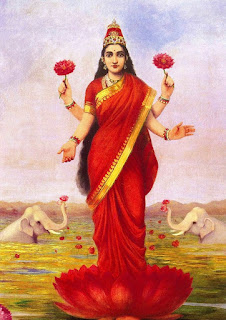I thought Lakshmi’s secret was interesting. The concept that “wealth can liberate” doesn’t seem very philosophical at first, thought the statement can be true. Though I feel like often times, wealth can only liberate from worldly wants.
I thought it was interesting that Lakshmi helps to establish the food chain.
I found interesting that Lakshmi is associated with elephants. Not only do elephants have no natural enemies, but they feed every day. This makes sense since she is associated with the food chain. It is also to be noted that the elephants are also closely associated with water. Water is the source of life.
It is important to note that Lakshmi’s association with the asuras stems from the idea that asuras are below the earth and all wealth exists below the earth. The seeds sprout from below the earth, “metal is created, and water is hidden.” That is why the asuras are associated with Lakshmi. The asuras do not want to give Lakshmi away.
Her value comes from when she leaves her father’s realm. The asuras must be killed in order to obtain Lakshmi.
Lakshmi’s pot belongs to Indra.
The agricultural cycles of India are associated with the killing of asuras. This is the cycle of Lakshmi being freed by the devas.
No explanation is offered to explain the wealth that the devas have. Devas are the “haves” and the asuras are the “have nots”.
It is not explained why Indra is fully entitled to Lakshmi. There is some confusion as to why this is. Some explain it that since Indra is a deva, he is good. But, he is sometimes depicted as a drunkard and so there is some confusion.
The conflict between the asuras and the devas is complex because neither can understand the other. I appreciated the comparison between capitalists and socialists. They are two completely different thought processes which is why they cannot see eye to eye.
Below is an image of the goddess Lakshmi.
Bibliography: Seven Secrets of the Goddess: Lakshmi's Secret by Devdutt Pattanaik.

Comments
Post a Comment